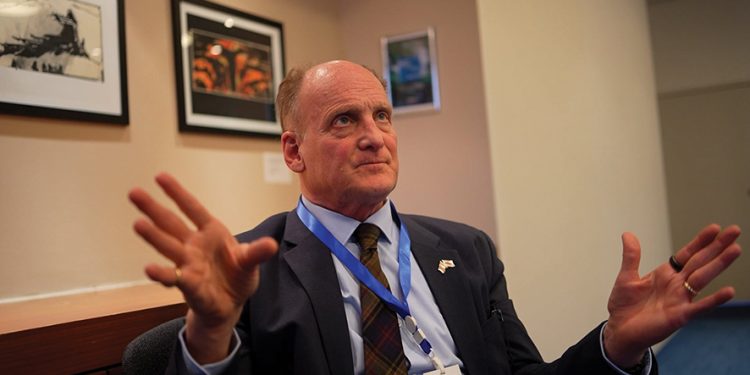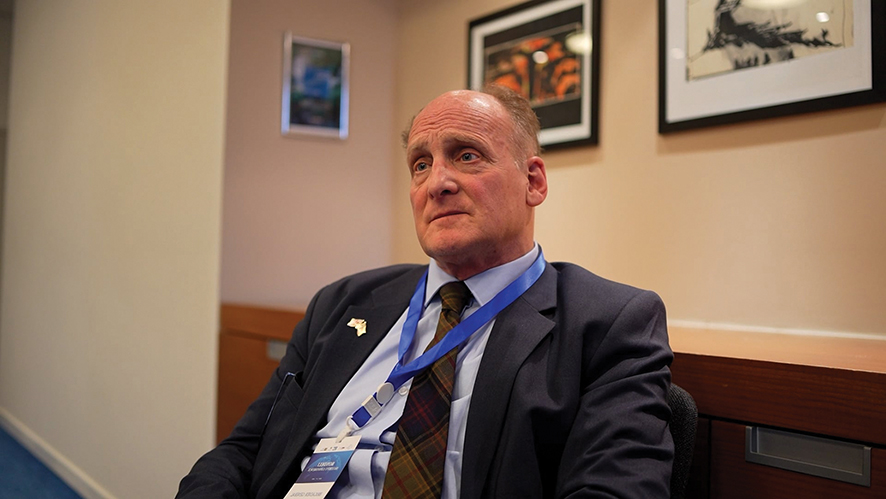by GEORGIA TODAY April 12, 2024 in Editor’s Pick, International, Newspaper, Politic

Brigadier General Peter B. Zwack (Ret.) served as the US senior defense official and attaché to the Russian Federation from 2012 to 2014, a period which included Russia’s first invasion of Ukraine. He also served in West Germany, Kosovo, South Korea, and Afghanistan. A published author, he has worked with Russian and international colleagues in multiple fields since 1989, including defense, security, academia, policy, veterans, and private citizens. He regularly consults, writes, and lectures within the interagency, defense, think tank, academic, and business sectors, and provides commentary on contemporary Russian and Eurasian security issues.
Radio Free Europe/RL’s Georgian Service sat down with him at the premises of the Rondeli Security Conference 2024, in Tbilisi.
We began by asking him to recall his time in Moscow, in particular the mood there in 2014 when Russia attacked Ukraine and annexed Crimea.
“From our side, diplomatically, militarily, we knew that something was happening in the lead-up to the attack – the Russian news media were showing on their history channel black and white reels of historic Crimea and World War 2, the Crimean War in the 1800s, and the Great Patriotic War. They were accusing NATO of putting a base into Ukraine. The tension was there, the troops moving around. Little Green Men, I will grudgingly say, was quite a stealth operation. And Crimea was infiltrated and occupied in a matter of a week. It happened so fast, the West just didn’t put the pieces together, because it was a very brazen act. And then right on the tail end of that, the Russians started to infiltrate into Donbas. That was an ugly fight. And as an attaché, we would be out on the roads in Russia at that time, and seeing all the troops and the trains and all that moving south. And it was a very, very ugly period.
Was there also a military intelligence breakdown? Or was it something that was expected but just not acted upon?
I think the pieces were seen in different ways, but not completely put together. And there was an aspect of not believing that it was going to happen. The indicators were there. We knew early on in the Donbas fight that there were Russian regulars there, and at that point, we were quite awake to the issue. It was in Crimea that they stole the march, the way the Russians did it, this stealth infiltration I mentioned. The nickname there for the Russian troops was Vezhlivie Ludy, “polite soldiers,” and they were very careful about violence in Crimea. Reluctantly, I’ll say it was well executed. And I don’t think we had any idea what to do- it was a fait accompli. We sanctioned the hell out of Russia, but there were no security guarantees for Ukraine, and nobody was ready to go to war with the Russians. And the Russians knew it.

Present day, two years into the Ukraine war – where do we stand?
We all thought in the beginning that the Ukrainians would be overrun in weeks, yet they actually proved to be a viable, proud, born-in-battle nation. It’s got flaws, issues, but this is a nation that existentially is fighting for its life, this is probably something that the Georgians understand more than just about anybody in the region, about fighting for one’s life, going back to 2008. Two years into it, I’d say the Ukrainians had the upper edge until about six months ago.
I was in Kyiv back in May, with a delegation, and spoke to a number of defense and governmental officials. There was a guarded optimism about the counter-offensive. But the military guys were frank, saying, “I wish you weren’t all talking so much about the counter-offensive. It’s putting a lot of pressure on us.” And all the media and everybody was doing the planning for the counter-offensive for them, and then this long period waiting for the weapons. The Russians, as we have seen, were about as ready as they could be for the counter-offensive, with their massive fortifications. You can put conscripts in heavy fortifications and they’ll fight better. And then the minefields. But after all this, and the beating the Ukrainian offensive, I remind people that this isn’t the end of the war, the United States and its allies in World War Two in Europe, we had several reverses in our European campaign and also in Asia.
Everybody’s gotten so used to the Ukrainians winning with Kyiv, Kharkiv and Kherson, I call it k-three, that when it didn’t work, “oh my God, that’s the end!” But it’s not.
But now the Ukrainians are in a tough, grinded out stalemate, where troop power and ammunition matter. And while the Ukrainians are better and more motivated, one could say the Russian military has improved a lot. There’s one thing about being beaten up and slaughtered, that those who survive learn. So the Russians still aren’t very good, but they’ve learned a lot. They’ve gotten more mass along the border. They’re in a 600-mile World War One type of trench line with a focus in Donbas and to the south. And the Ukrainians are holding their own, but they are in a little bit of a Russian bear hug, they’re tight, they’re close, lots of artillery, lots of infantry. The Russians are taking much bigger losses, but the Ukrainians are taking a lot of losses too. And then you have these extraordinary, offsetting asymmetric successes by Ukraine in the Black Sea, they are remarkable.
Two years on, this merciless invasion is as vicious as it was on day one. Ukrainians are holding their own, but we just had Avdiivka, which was a bloody fight. And the Ukrainians had to pull out from Bakhmut. These are Verdun-type fights, where they took out a disproportionate amount of Russians, but they’ve lost a lot of Ukrainians too, and now they’re pushing towards Robotyne and some other towns. How long does the Ukrainian front hold, especially when they’re not getting the ammunition and the aid that they so desperately need? This is a crisis.
In many ways, Russia looks at the Ukrainian fight as more than just a fight. They want to subjugate Ukraine. And they’re trying to break the West, and Western cohesion. Putin has his legs back under him, it seems, and he’s back in charge. They survived Prigozhin a few months ago and they are grinding and pushing because they have a military system that is remorseless with its own people, throwing in grunts, convicts and all that.
We are at a decision point: Who are we? What are we – Europe, expanded Europe, Eastern Europe, United States, the North Atlantic relationship, if we let Ukraine to fail or be forced into a treaty or settlement, a ceasefire it doesn’t want? Then we forced them into it almost in a form of appeasement to the Russians. We don’t want to go to war with Russia, but Ukraine is the line. And we just can’t let them down. We need to pull together, stay together. We have major problems in my country, the US, that we’ve got to get through politically. Because we, I don’t want to oversell it, but we set an example. And we’re looking pretty confused and irresolute right now, despite the best efforts of the current administration.
It’s been 7 months since the last US supplemental aid. How many more will Ukraine have to wait?
This is sadly, in my mind, naked American politics. It’s no secret that there is mostly bipartisan support for Ukraine, that there is a wing of the Republican Party and the former president that wish to see Ukraine defeated, or at least don’t support it. And it couldn’t come at a more critical time. I believe we will get our package eventually, but it’s taken too long. I want to believe it’s going to be sorted out in the next month. It’s such an awful issue and situation. One of the problems the US has is that much of our population, certainly in the countryside, have not been well educated on Ukraine and what it means to them. And right now, it’s painted as sucking resources and that it’s expensive; it’s increasing the cost of food and life and gas and all of that. But we suffered through this before World War Two as well; we went through isolation. It’s incredibly dangerous. It’s short-sighted. It’s naive. And I think that our politics are twisted. And within certain aspects of that right-wing group, the MAGA group, they’re less sympathetic to Ukraine, and some of them, including the former president, even admire the Russians and Putin.
If Donald Trump comes back, what does it mean for the war in Ukraine?
I still hope he’ll be defeated, though right now it’s 50/50 that he will be the next president. I think we’ll retrench in some ways. Our alliances won’t go away, but it will become increasingly transactional again; it’ll be us against them. The US may be more directive in nature. Or Trump might decide the [Transatlantic] alliance isn’t good for America, for whatever his reasons are.
This is why it’s so important that we have it now, in our own law, codified, that a US president cannot unilaterally break the United States away from NATO. So there are precautionary things that are being done in Legislation and Judiciary, but it’s there. What Trump may do is give the Russians motivation. I think Putin has a big, big, big asterisk on his calendar for the American elections. And if Trump wins, he believes that’s a win for Moscow.
What would Trump’s Ukraine policy look like? Keeping in mind his famous claim that he would end the Ukraine war in 24 hours?
I don’t know. Ok, this is sheer speculation: He would work some deal-with-the-devil peace deal. There’s a strong man aspect of Trump. He may want to put muscle into it or something. He doesn’t have diplomatic finesse; he sees himself as a hardcore businessman. I think it’ll be troublesome. But you have a large foreign policy and large constituency in the United States that won’t agree with that. So he won’t have it easy. That said, he is clearly less interested in our security relations, in Europe and Asia, in Russia and South Korea and Japan; he has a feeling that our allies are free riding on United States’ defense. So it, as a minimum, will encourage Putin to be more aggressive on the margins of NATO. And it’ll shake the trust of our allies in the US, it will force the Europeans to be even tighter. I believe that Trump being president would be profoundly destabilizing, certainly in the near term, of what our long term World Order interests are.
What’s his problem with Ukraine, do you think?
Well, I think it’s a financial problem and he’s not always been positive about it. To be very blunt, he was embarrassed and impeached because of his misadventure, and trying to influence Zelensky in 2020. He got called out by Colonel Alex Vindman. And people on the NSC staff said “you can’t do that.” And then it came up into our congressional system and Trump got impeached. So I think that when he looks at Ukraine, he sees red, and he sees them as that whole screw-up, as a source of so many of his problems. I think he hates Ukraine, and he’s behind the scenes playing the strings. I believe there’s a large at heart, bilateral Republican group that are intimidated by the former president. And then, finally, there’s this side of Trump that has this weird admiration for Putin. I don’t know what the basis of it is, but it’s complex and murky and wrong.
Interview by Vazha Tavberidze